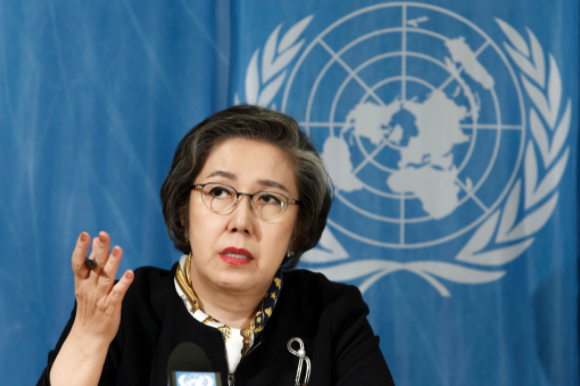Yanghee Lee quoted in SBS News Australia
‘The world has ignored us’: Myanmar resistance leader urges more support from Australia
Eight months after the military coup in Myanmar, a key figure in the self-appointed shadow government has accused the world of forgetting about the country and urged Australia to do more to dismantle the junta’s regime.
3 October, 2021
By Abbie O’Brien
Dr Sasa fled Myanmar after the February military coup for two reasons.
The first, he says, was to save his life.
The second was to become a voice for his people.
“I was not safe. I would have been killed or arrested. I realised the military would try everything they can to silence us,” Dr Sasa, who only goes by one name, told SBS News from an undisclosed location.
Dr Sasa, along with other exiled members of former leader Aung San Suu Kyi’s ousted government, formed the National Unity Government (NUG) following the coup.
The self-appointed shadow administration, which also includes representatives of Myanmar’s armed ethnic groups, is seeking to regain control of the country.
While he has become a voice for his people, he says the world is no longer paying attention to Myanmar.
“We are facing crimes against humanity. We are facing a humanitarian catastrophe. We are facing a COVID-19 crisis,” he said. “It is [going] unchecked, it is out of control, yet the world has ignored us. They have closed their eyes.”
Since the coup, the junta has killed more than 1,100 people, according to the United Nations. The UN says more than 8,000 civilians have been arbitrarily detained and more than 230,000 people have been forcibly displaced.
Last week, the UN Special Rapporteur on human rights in Myanmar, Thomas H. Andrews, accused the military of committing crimes against humanity.
“The junta had killed protesters in the streets, murdered civilians in their homes, beaten individuals to death, and tortured people to death while in detention,” he told the Human Rights Council.
“Eight months of asking and [the response] is still inadequate – and so what’s happening is we are being forced to defend ourselves from being killed,” he said.
He is urging Australia to take stronger action against the junta.
“We have been asking for the Australian government to please sanction the [military],” he said.
The Morrison government has faced domestic pressure to take a harder stance against the military leaders behind the coup.
Greens Senator Janet Rice said Australia should have imposed tougher sanctions in the immediate aftermath.
“We’ve been dragging our feet,” she said. “If the world wants to see the conflict resolved peacefully, well then the world needs to be applying really strong pressure on the junta and that means targeted sanctions.”
In a statement, the Department of Foreign Affairs said: “Australia supports democracy in Myanmar, and calls for the peaceful resolution of the political situation and constructive dialogue between the parties.”
“Australia is concerned about any actions that might lead to further violence and loss of life. We urge restraint from both the military regime and the ‘National Unity Government’, and will continue to do so.
“Australia continues to support ASEAN’s (the Association of Southeast Asian Nations) leading role in responding to the situation in Myanmar.”
Last month, the NUG declared a “defensive war”, urging the people of Myanmar to revolt against the military.
While the calls initially sparked fears of a civil war, Dr Sasa says it was not a call to arms, but rather a plea for the people of Myanmar to unite in the face of the regime. It was also a cry for help.
“What our announcement means is recognising the reality of what is happening on the ground and also asking the international community why they are so silent and why is there no action,” he said.
Professor Yanghee Lee, the former UN special rapporteur to Myanmar, says the international community must stop viewing the conflict as two-sided.
“It was the unlawful junta [that carried out] unilateral violence against the people for months – and yet the international community says all parties should stop violence,” she told SBS News.
This week, the group released a statement calling on the international community to designate the military junta a terrorist organisation, and accused it of committing public torture and executions.
UN Secretary-General Antonio Guterres also warned in a report this week the opportunity to prevent the junta from entrenching its rule could be narrowing.
Myanmar military spokesman Zaw Min Tun has accused the NUG – which the junta considers a terror group – of trying to destabilise the country
He has also brushed off its declaration of a “defensive war”, saying it will not succeed, and accused media groups of “spreading fake news” on the situation in Myanmar.
Both Senator Rice and Dr Sasa are calling for the Australian government to recognise the NUG.
For a start, Senator Rice says, it would ensure critical international aid is distributed directly to the people of Myanmar, rather than the military.
“It’s really concerning that the aid isn’t reaching the hands of the people that need it,” she said.
“The National Unity Government … are actually very well organised and they’ve got systems of distributing aid. So if we recognise [them] or the very least even worked effectively with them, we would be able to be getting aid to the people that need it.”
Dr Sasa says international recognition is the first step towards dismantling the regime.
“When they publicly recognise us and engage with us and announce us and support us, that is the beginning of the end of military junta in Myanmar.”


